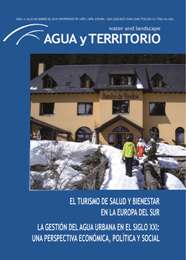Las termas de la ciudad de Viterbo: del termalismo social a la elaboración de proyectos innovadores destinados a relanzar el turismo de bienestar.
DOI:
https://doi.org/10.17561/at.v0i6.2811Palabras clave:
sector balneario, termalismo social, Italia, balneario de Viterbo, turismo de bienestarResumen
Las razones que llevaron a la elaboración de esta investigación están relacionadas, principalmente, con unos aspectos del termalismo italiano en los que no se ha profundizado mucho hasta ahora. Se quiere poner de relieve los cambios que la intervención del Estado produjo en el sector termal; a lo largo del siglo XX nació un modelo de desarrollo innovador que se sitúa más allá de la lógica del mercado, basándose en un termalismo social que cuenta con el apoyo financiero del Estado. A finales del siglo, por haberse vuelto muy oneroso, dicho apoyo fue disminuyendo drásticamente y el sector termal se vio obligado a elaborar nuevas estrategias para salir de una situación realmente muy crítica.
Tras haber trazado un marco general de la situación, la investigación se orientó hacia el “estudio de caso” del balneario de Viterbo. Se analizaron los sucesos de esta estación termal, desde un punto de vista histórico, aprovechando fuentes de archivos inéditas; al mismo tiempo, para analizar la situación actual, se tuvo que acudir a investigaciones recientes llevadas a cabo por las instituciones locales cuyo principal objetivo era revitalizar los flujos turísticos, también a través del encuentro entre termalismo y bienestar.
Descargas
Descargas
Publicado
Número
Sección
Licencia
© Universidad de Jaén
Los originales publicados en las ediciones impresa y electrónica de esta Revista son propiedad de la Universidad de Jaén siendo necesario citar la procedencia en cualquier reproducción parcial o total.
Salvo indicación contraria, todos los contenidos de la edición electrónica se distribuyen bajo una licencia de uso y distribución “Creative Commons Reconocimiento 4.0 España” (CC-by). Puede consultar desde aquí la versión informativa y el texto legal de la licencia. Esta circunstancia ha de hacerse constar expresamente de esta forma cuando sea necesario.














